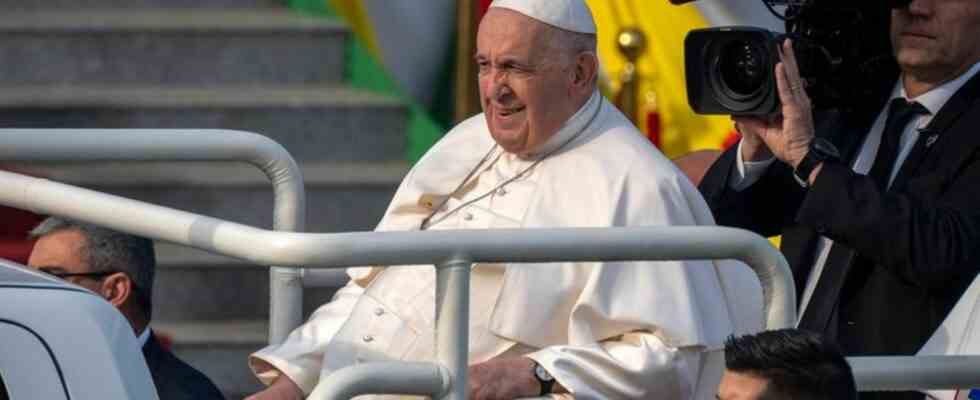Africa trip
Pope puts pressure on politics in South Sudan
Aware that South Sudan has a long way to go towards a future without fighting and violence: Pope Francis. photo
© Ben Curtis/AP/dpa
Years of bloodshed and one of the biggest refugee crises: Pope Francis shows his compassion to the people in South Sudan. Now it’s the turn of the politicians. There is hope.
After years of civil war and bloody attacks in South Sudan, Pope Francis has increased hope that the bloodshed will end. With emotional appeals for peace, the pontiff put pressure on the leaders of the Christian country in East Africa during his historic visit.
At the same time he assured the many people and above all the millions of refugees in the bitterly poor republic of his sympathy. Tens of thousands of people poured into the streets of the capital Juba at the weekend, singing and dancing at the open-air services.
Even before Francis boarded the plane back to Rome, President Salva Kiir described the visit as a “milestone” for South Sudan. After the spiritual rebuke when the head of the Catholic Church criticized the country’s decision-makers in an unusually direct speech for their policies, they now have a duty. It is important to consistently implement a peace agreement that has actually already been agreed and to bring other political groups to the negotiating table – so that the constant violent attacks can finally stop.
“I am with you. I suffer for you and with you”
“I’m afraid of what my life and the lives of other children will be like in the future,” 16-year-old Joseph Lat Gatmai said during an emotional meeting with the Pope on Saturday. The boy is one of around two million internally displaced persons who are living in camps in South Sudan under sometimes dramatic conditions and with currently no prospect of improvement. “I am with you. I suffer for you and with you,” Francis called out to the displaced.
The United Nations ranks the refugee crisis as the largest in Africa and the third largest in the world. The UN has set up seven detention centers for internally displaced people since 2013, when civil war broke out two years after independence. The living conditions are sometimes dramatic: clean drinking water is scarce, diseases such as cholera and malaria are making the rounds. Many children are malnourished. After nationwide floods in 2022, the situation worsened.
Women and mothers ‘key to transforming the country’
Women and children, who often become victims of sexual violence, are particularly affected by displacement. The women and mothers are “the key to transforming the country,” said Francis. During the first part of his trip to Africa in the Democratic Republic of the Congo, the pontiff prayed for an end to violence against women and heard some shocking reports from victims of violence.
The enthusiasm for the first visit of a pope was great in the youngest country on earth. Again and again the faithful in Juba received the high guest with their typical shouts of joy and songs. Around 100,000 people came to a public fair.
Francis knows that South Sudan has a long way to go towards a future without fighting and violence. At least 20 people were killed in an attack on a village on Thursday, including four Red Cross volunteers. The country is one of the most dangerous regions for humanitarian workers in the world.
“Honest commitment to peace without alternative”
As soon as he landed, he told the leaders what the Pope expected from politicians. “So that this country doesn’t degenerate into a graveyard,” there is no alternative to an end to the fighting and an honest commitment to peace. “Future generations will honor or erase the memory of your names based on what you do now,” Francis said of President Kiir and his vice presidents, who were once enemies and now find themselves in a fragile alliance.
The Pope’s word could carry weight with the politicians, some of whom are very religious. Kiir promptly ordered 71 prisoners to be pardoned – around half of those imprisoned had been sentenced to death. A corresponding decree was read out on the state-owned TV station.
Kiir also announced that he intends to resume the so-called Rome talks, in which other rebel groups are involved in the peace process. The Catholic community of Sant’Egidio, as mediator, hopes to get the next round of negotiations, including five new groups, together in Rome at the end of February or in March. If they sign the peace document, this could significantly reduce the violence in the country, said Tobias Müller from Sant’Egidio of the German Press Agency in Juba.

